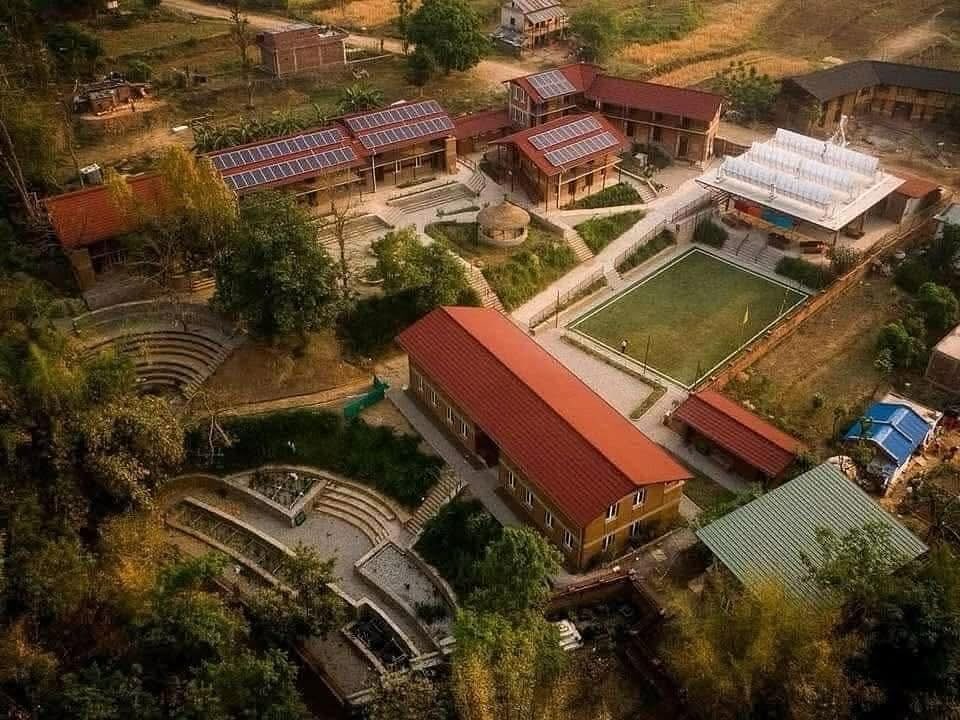Overview
Kopila Valley School is located in Birendranagar, Surkhet, within the Karnali Province of Nepal. Operating as a not-for-profit private institution, the school provides education from preschool through Grade 12. KVS is officially affiliated with the National Examination Board (NEB) and the Ministry of Education (MoE).
What sets Kopila Valley apart is its strong focus on making education available to children who might otherwise be left out. The school is committed to helping students from underprivileged backgrounds thrive—not only academically but also socially and emotionally. With its welcoming environment, dedicated staff, and sustainable campus, it has become a positive force in rural education in Nepal.
Quick Highlights
-
Location: Birendranagar, Surkhet, Karnali Province, Nepal
-
Affiliation: National Examination Board (NEB), Ministry of Education
-
School Type: Not-for-Profit, Private
-
Grades: Preschool to Grade 12
-
Learning Approach: Place-based, active learning
-
Focus Areas: Equity, sustainability, child well-being
-
Medium of Instruction: English and Nepali
-
Support Services: Counseling, Health Clinic, Meals, Scholarships
Academic Programs Offered
Kopila Valley follows Nepal’s national curriculum, but does it in a way that’s practical and relatable. Students learn core subjects such as Math, Science, English, and Nepali, but there is also room for creativity, problem-solving, and life skills.
From the early years through high school, classes are designed to be interactive and engaging. Learning occurs not just in books, but also in gardens, labs, and community spaces. Older students prepare for national exams and future education while exploring real-world challenges through hands-on projects and group discussions.
The school places a strong emphasis on values—responsibility, kindness, and environmental care—and that is evident in every classroom.

Admission Process
Admissions at Kopila Valley School are open to children from families facing challenging circumstances. Education here is offered free of cost to those who meet the criteria.
Key Dates:
-
Weeks 1–3: Application forms distributed
-
Week 4: Submission deadline
-
Week 5: Interviews with families
-
Week 6: Home visits for deeper understanding
-
Week 7–8: Shortlisting and final selection
-
Week 9: New academic year begins
Who Can Apply?
Children from vulnerable families—orphans, children with a single parent, those with disabilities, or families living in extreme poverty—are prioritized.
Required Documents Include:
-
Birth certificate
-
Parent or guardian citizenship
-
Medical history (if available)
-
Letter from the local ward office
-
Photos of the child and guardian
-
Home location sketch
-
Commitment letter from local guardian (for students from Surkhet)
The school works diligently to ensure the process is transparent and fair, involving local community members on the evaluation committee.
Teaching Faculty and Learning Methodology
The teachers at Kopila Valley aren’t just educators—they’re mentors and role models. Most are from the local area and have a deep understanding of the community. They receive regular training to keep their teaching styles fresh and engaging.
Lessons are practical, often connected to local life, and encourage students to ask questions and think critically. Emotional well-being is also an integral part of the learning process, with activities designed to foster confidence, compassion, and practical communication skills.
Infrastructure and Learning Facilities
The school’s campus is known for its eco-friendly design and thoughtful layout. Built with locally available materials, such as rammed earth, the classrooms remain cool in summer and warm in winter.
Some key facilities include:
-
A well-stocked library
-
Computer and science labs
-
On-site health clinic
-
Mental health and counseling center
-
Solar-powered kitchen and rainwater collection systems
-
Green spaces for gardening and play
Every corner of the campus is used for learning, care, or reflection. It’s a space that feels safe and full of possibilities.
Student Life and School Experience
Life at Kopila Valley is active and community-focused. Students help take care of gardens, run student-led activities, and participate in daily mindfulness exercises. Each child is encouraged to take part, speak up, and take responsibility.
The school believes learning shouldn’t be limited to classrooms, so children often learn through field visits, service work, and real-world problem-solving.
Extracurricular Activities (ECA)
Beyond academics, students can join a range of activities that help them explore interests and discover talents:
-
Music and traditional dance
-
Arts and crafts
-
Drama and public speaking
-
Sports events
-
Environmental action groups
-
Leadership clubs and debate teams
Annual celebrations, competitions, and cultural events make school life vibrant and memorable.
Scholarships and Financial Support
Every student at Kopila Valley receives a full scholarship. This includes:
-
Tuition and exam fees
-
Daily meals and snacks
-
School uniforms and supplies
-
Access to medical care and counseling
-
Participation in clubs and activities
This support allows students to focus on learning without worrying about financial pressure at home.
Achievements and Institutional Milestones
Kopila Valley School has gained recognition both in Nepal and abroad for its impact in education, sustainability, and social change.
Some notable achievements:
-
Honored as the most sustainable school campus in Nepal
-
High success rates in national board exams
-
Former students now working or studying across Nepal and internationally
-
Trained dozens of teachers through in-house development programs
-
Developed a working model for other rural schools to learn from
Why Choose This Institution?
If you are a family seeking real opportunity for your child or a policymaker looking for effective local models, Kopila Valley School offers a strong example. It blends practical learning with emotional and social development, holding firmly to its belief that all children deserve a chance to succeed.
This school doesn’t make promises—it quietly gets the work done. And that’s what makes the difference.
Conclusion
Kopila Valley School is more than a place where students go to learn. It’s a place where young minds grow with dignity, families find support, and communities see hope. It proves that with the right mindset, thoughtful leadership, and consistent care, education can change lives—one child at a time.
Contact Address:
Location: Birendranagar, Surkhet, Karnali Pradesh, Nepal
Phone No: +977-83-412169
Email: website@kopilavalley.org
Website: www.kopilavalleyschool.edu.np



